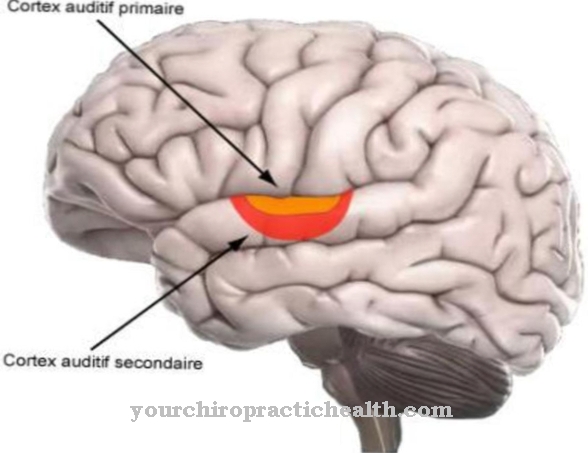Blurred vision is a symptom of an illness or an injury. Since the causes can be varied and permanent damage to the eyesight cannot be ruled out, medical treatment is always necessary.
What is blurred vision?

The term blurred vision is understood by medical professionals as a limitation of vision that leads to a disruption of perception.
The environment or individual objects appear indistinct or as if veiled by a fog. Both eyes or just one eye can be affected. The blurred vision may only appear temporarily and then disappear again temporarily.
Since visual disturbances are always symptoms of a disease or damage to the eye or other organs involved, for example, it is advisable to consult a doctor in any case. Depending on the cause, blurred vision can also be accompanied by other symptoms such as headaches.
causes
Blurred vision can have a variety of causes. For those who wear glasses, it is possible that the visual strength of the visual aid is no longer sufficient and new glasses are required. A rapid and significant clouding of the eyesight should definitely be taken seriously, as this can be a disease such as a cataract or glaucoma.
Diabetes, multiple sclerosis, or a migraine attack can also contribute to blurred vision. Disturbances in the brain, for example caused by a stroke, often impair vision.
Anxiety and panic patients often suffer from blurred vision, which can only be exacerbated by the fear of permanent blindness. Ultimately, direct damage to the eye, for example as a result of an accident or injury, can also be responsible for the symptoms.
You can find your medication here
➔ Medicines for visual disturbances and eye complaintsDiseases with this symptom
- Cataract
- glaucoma
- Diabetes mellitus
- multiple sclerosis
- migraine
- stroke
Diagnosis & course
If vision is blurred, a doctor should be consulted who will first talk to the patient in detail. He thereby learns more about the type of visual impairment, the first occurrence of the same and any accompanying symptoms.
An examination of the eyes including an eye test, eye pressure measurements and possibly an ophthalmoscope can provide further information about the cause of the symptoms. A blood test and / or ultrasound can help confirm the diagnosis.
Blurred vision should always be clarified medically, as it can hide a serious illness. In some cases, the symptoms worsen, including temporary or permanent blindness. Some diseases can even lead to death if left untreated.
Complications
Blurred vision can have a profound effect on everyday and professional life. Those affected are no longer really receptive, especially in traffic, and accidents can increase. In addition, this is often a psychological burden for people who can then develop depression if their blurred vision becomes chronic.
A cataract, for example, which causes blurred vision, can in the worst case lead to blindness if left untreated. But even a cataract operation can rarely cause various complications. On the one hand, the capsule can tear during the operation. The gelatinous mass in the eye, namely the vitreous body, can escape through the resulting opening.
As a result, the retina can peel off, making visual impairment worse. On the other hand, pathogens can enter the eye or bleeding can occur. Furthermore, multiple sclerosis can lead to severe muscle weakness, which can lead to restricted movements. The affected person usually also suffers from incontinence, so that they need care.
The immune system is also weakened somewhat, so that infections, especially in the respiratory tract, accumulate.In some cases, changes in personality are also observed. In addition, multiple sclerosis is a strong psychological burden for those affected, as the disease cannot be cured.
When should you go to the doctor?
Blurred vision that occurs due to fluctuations in blood pressure during or after physical exertion usually disappears on its own within a short time and does not require medical attention. Strong psychological tension or a brief overload of the eyes, for example from working too long at a computer screen, can lead to temporary blurred vision that does not require treatment.
On the other hand, visual disturbances that suddenly set in without an identifiable cause should be clarified as soon as possible by an ophthalmologist who, unlike a general practitioner, has the appropriate technical diagnostic equipment. If the eyesight deteriorates due to chronic illnesses such as high blood pressure or diabetes mellitus, the underlying illness must be treated accordingly by the family doctor or internist.
Blurred vision due to ametropia can easily be compensated for by wearing glasses or contact lenses: The optician can adjust suitable visual aids - to rule out eye diseases, an ophthalmologist should still check it out. The sudden worsening of a known visual impairment also makes an ophthalmological examination necessary. The family doctor or emergency medical service should be called in immediately if the blurred vision is accompanied by other complaints such as nausea, dizziness and headaches.
Doctors & therapists in your area
Treatment & Therapy
Once the cause of the blurred vision has been found out, the attending physician (usually the ophthalmologist) can initiate appropriate therapy. This always depends on the respective reason for the complaint.
If the visual disturbances occur as a result of nearsightedness or farsightedness, it is usually sufficient to provide appropriate visual aids to eliminate the symptoms. Alternatively, surgical intervention is also possible to get rid of the visual disturbances. If a migraine is the trigger for blurred vision, drugs known as antiemetics are usually used to relieve the symptoms.
Diseases that cause diabetes require a regulation of the insulin level, so that a complete restoration of the eyesight takes place as a result. Retinal detachment, which can also lead to blurred vision, must be treated surgically in many cases. This procedure is carried out with the help of laser beams and promises good results.
Basically: The earlier a doctor is consulted, the higher the likelihood that vision can be restored and permanently maintained.
Outlook & forecast
Blurred vision can appear in many situations and go away after a short time. This is a harmless symptom that does not need treatment. It is not uncommon for migraines or severe headaches to occur. After a short time, however, the blurred vision disappears on its own.
Should the eyesight decrease, a visit to an ophthalmologist or an optician is necessary. Under no circumstances should those affected do without a visual aid, because if they do not wear visual aid, their eyesight will usually deteriorate further and decrease. In most cases, long-term poor eyesight won't go away on its own. Conversely, however, it can deteriorate over time.
In adulthood it is possible to correct the visual defects with a laser. This procedure is not performed in children and adolescents, as the eyesight usually changes at a young age. The blurred vision only restricts everyday life if no visual aid is used. With a visual aid, there are no longer any special restrictions or difficulties.
You can find your medication here
➔ Medicines for visual disturbances and eye complaintsprevention
Blurred vision can only be prevented to a limited extent. Certainly, a healthy lifestyle will help maintain eyesight, overall health, and prevent disease. However, if the first symptoms occur and blurred vision is detected, it is advisable to seek medical help promptly, as this increases the chances of recovery even in the event of a more serious illness. The contact person in this case is the ophthalmologist.
You can do that yourself
Depending on the cause, blurred vision can be alleviated with various home remedies and measures. If foreign objects in the eye (shampoo, dust, etc.) lead to the visual disturbance, it is usually sufficient to rinse the eyes and protect them from further irritation. Special eye washes from the pharmacy as well as home remedies such as chamomile tea or rose water reliably rid the eyes of foreign bodies and act acutely against itching and pain.
Blurred vision due to conjunctivitis should be treated by an ophthalmologist. In addition, the view can be improved by cold compresses and protection. In addition, sources of irritation and substances such as bright light, pollen or allergens should be avoided. Those who regularly suffer from blurred vision may need visual aids. The pinch test shows whether the blurred vision is due to poor eyesight. In addition to visiting the ophthalmologist, you can sometimes improve your vision with simple eye exercises.
If the blurred vision is caused by contact lenses, switching to glasses is often a remedy. In addition, eye drops and a balanced diet with sufficient iron, zinc and vitamins can improve vision and alleviate blurred vision in the long term. If these measures show no effect, an ophthalmologist should be consulted.

.jpg)
.jpg)
.jpg)
.jpg)
.jpg)










.jpg)







.jpg)



